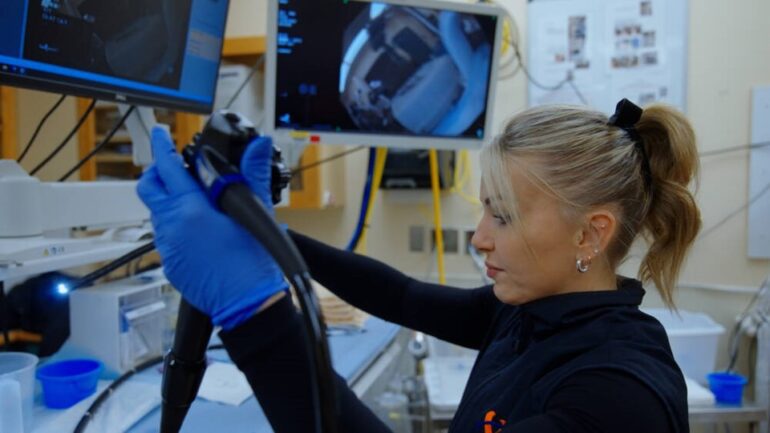TL;DR:
- Fraser Health invests $1.2 million in GI Genius, an AI system, to enhance colon cancer screening.
- The AI technology detects pre-cancerous polyps, reducing missed findings and improving patient outcomes.
- GI Genius provides real-time insights, acting as an objective observer for medical teams during colonoscopies.
- Fraser Health’s Colon Cancer Screening Program, one of BC’s busiest, aims to boost early detection rates.
- Early-stage colon cancer detection leads to a survival rate of over 90 percent.
- AI’s role in healthcare research signifies a broader trend in improving patient care through technology.
Main AI News:
In the ever-evolving landscape of healthcare, cutting-edge technology continues to play a pivotal role in improving patient outcomes. Fraser Health, a leading healthcare provider, is taking a proactive step by integrating Artificial Intelligence (AI) into its medical practices. The GI Genius, a sophisticated computer-aided system, is set to revolutionize the field of colonoscopies, enhancing accuracy and enabling the early detection of precancerous lesions.
Colon cancer is a prevalent and life-threatening disease, but with the advent of AI, Fraser Health is on a mission to change the odds. Their commitment is exemplified by a substantial investment of $1.2 million to deploy the GI Genius across 12 prominent sites. These sites include Abbotsford Regional Hospital, Burnaby Hospital, Chilliwack General Hospital, Delta Hospital, Eagle Ridge Hospital, Langley Memorial Hospital, Peach Arch Hospital, Royal Columbian Hospital, Ridge Meadows Hospital, Surrey Memorial Hospital, Mission Memorial Hospital, and Jim Pattison Outpatient Care and Surgical Centre.
Dr. Scott Cowie, a Surgeon at Langley Memorial Hospital, underscores the significance of this technological leap. He emphasizes, “This is a huge benefit for our patients. By detecting and treating polyps early, we’re reducing the risk of missed findings and improving the quality of life for people in our region.”
At the heart of this innovation is the GI Genius, a system that harnesses the power of artificial intelligence to identify pre-cancerous polyps within the intestinal tract, a key precursor to colorectal cancer. Working seamlessly with existing medical tools, this technology provides real-time insights, empowering doctors and endoscopists to deliver immediate and precise care.
Visually resembling a discreet black box, the GI Genius operates as a vigilant “genie,” capable of spotting polyps or lesions that might escape the human eye. Dr. Cowie elaborates, “The AI system gives us a second set of eyes in the room, with a computer system looking at digital images in real time and drawing the endoscopy team’s attention to something that may be abnormal. You have an objective observer on your shoulder all the time, not tired, pointing out something that may be of concern.”
Fraser Health’s Colon Cancer Screening Program is renowned as one of the busiest in British Columbia, with over 13,000 referrals last year. Patients are typically referred to the program following a positive result from a fecal immunochemical test (FIT) or due to their risk factors associated with colon cancer based on their medical history and family background.
Early detection is the linchpin in the battle against colon cancer. When detected at its earliest stage, the chances of survival soar to over 90 percent. Kate Keetch, Director of Research and Evaluation Services at Fraser Health, underscores the potential of AI, stating, “There is a tremendous amount of work underway globally and within our own organization to enhance health care through research studies that explore the utility of artificial intelligence. Leveraging AI to better screen for colon cancer is an example of how machine learning is giving us the opportunity to provide better patient care.”
Conclusion:
Fraser Health’s strategic investment in AI-driven colon cancer screening technology not only strengthens its commitment to patient care but also underscores the growing influence of AI in healthcare. This move aligns with the broader market trend of leveraging artificial intelligence to enhance patient outcomes and improve the quality of healthcare services.

